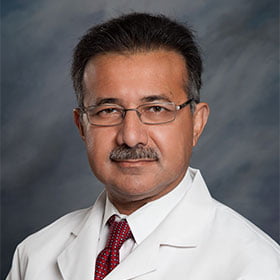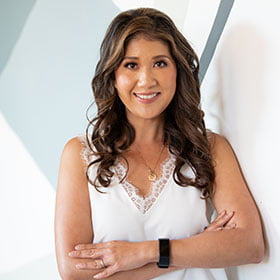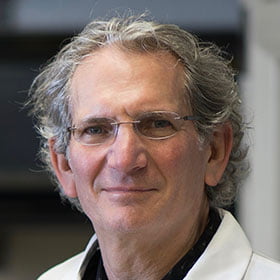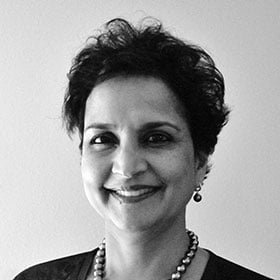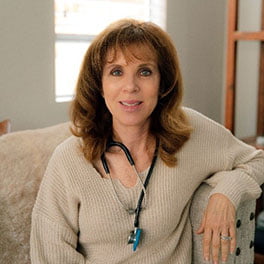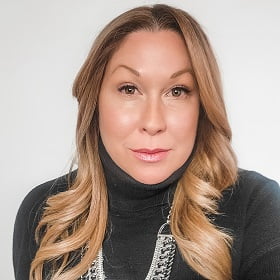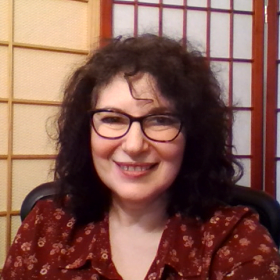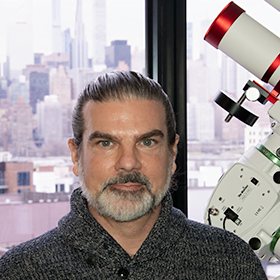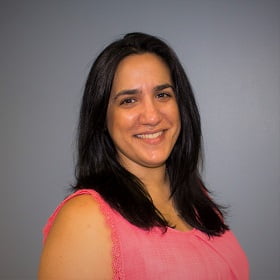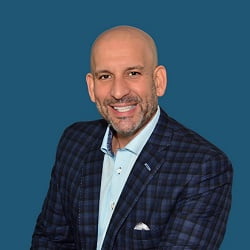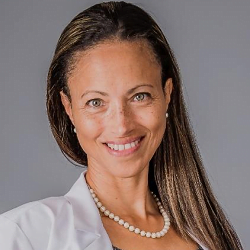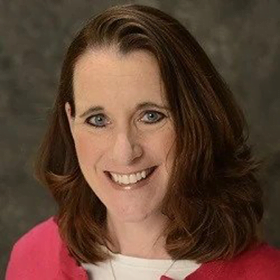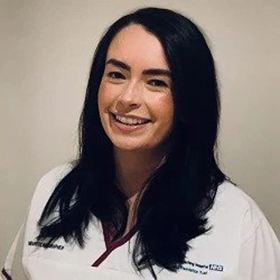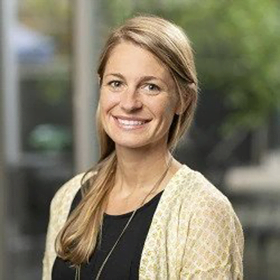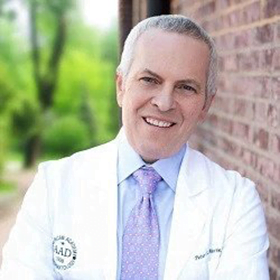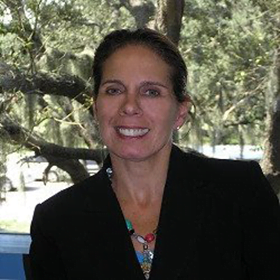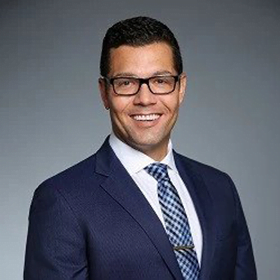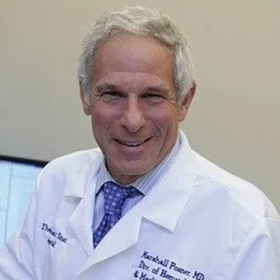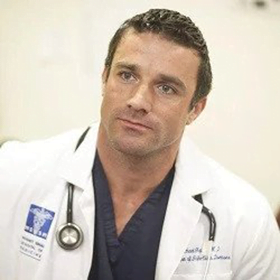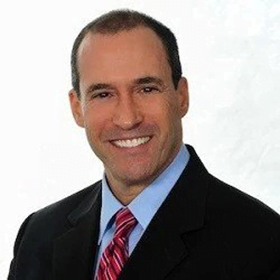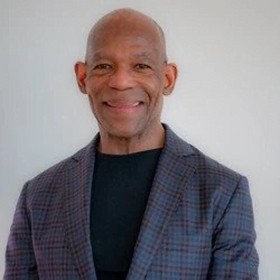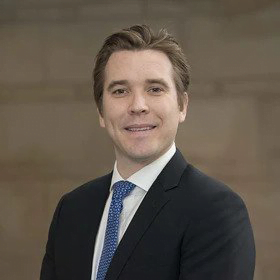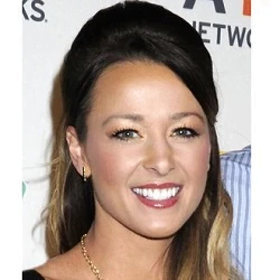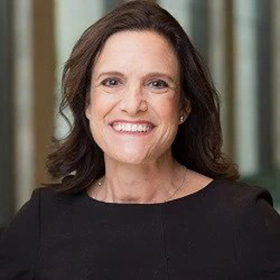
Stephanie V. Blank, MD, is the Director of Gynecologic Oncology for the Mount Sinai Health System, a Professor in the Department of Obstetrics, Gynecology, and Reproductive Science at the Icahn School of Medicine at Mount Sinai, and the Director of Women’s Health at the Blavatnik Family – Chelsea Medical Center at Mount Sinai. Dr. Blank, who specializes in the treatment of patients with ovarian, cervical, and uterine cancers, and the care of women at increased genetic risk for gynecologic cancer, joined the Icahn School of Medicine at Mount Sinai in 2017. Previously, she spent 15 years at the NYU Langone Medical Center, where she rose from Assistant to Associate to Full Professor, built a busy clinical practice, launched and ran the Gynecologic Oncology Fellowship Program, developed a cancer risk assessment program for underserved women at Bellevue Hospital, and directed the Gynecologic Oncology Research Program.
Dr. Blank’s research focus is on genetic predisposition to cancer, novel therapeutics and translational research, survivorship, quality of life, and fertility preservation. She serves on the Ovarian Committee of the national cooperative group NRG and has been a principal investigator for investigator-initiated as well as industry-sponsored and cooperative group trials. Dr. Blank is broadly published in peer-reviewed journals and text books and frequently presents at seminars and conferences on women’s gynecologic oncology issues. She is the recipient of many honors and awards, including Castle Connolly Top Doctors, Super Doctors, and the Council on Resident Education in Obstetrics and Gynecology Teaching Award, among others.
Screening for Cervical Cancer in the General Population and HPV Cancer Survivors
What can you tell us about screening for cervical cancer?
Screening for cervical cancer has been extremely successful and offers us great opportunity to improve women’s health worldwide. In the general population, thus far co-testing — PAP smears plus HPV testing—has been the standard of care for people over 30 (and pap alone for people aged 21-30). There is a move toward recommending HPV testing alone for screening because the HPV test is objective. This has potential to increase the availability of and access to screening, cost less, and save more lives.
For the purposes of cervical cancer screening for someone that has already had an HPV associated cancer, while there are not specific guidelines of which I am aware, I would tend not to be as eager to space screening out as has been happening with cervical cancer screening. I think it’s important to look at things with a pan-HPV type of view.
Are Pap smears unreliable once a patient has had radiation?
In general, I think you probably get a lot more insufficient pap smears after radiation. I think after radiation, much more valuable really would be HPV testing, which isn’t really accepted as a standard in terms of picking up recurrence for cervix. But the cytology, the Pap smear, is looking at cells, which are altered in a person who has had radiation, while the HPV test is a DNA test. So, I think that has a bigger role in following cervical changes in somebody who’s had prior radiation. Again, it’s not the standard of care for cervix, but, really, the Paps in post-cervix cancer follow up are really not particularly helpful.
Preventive Measures for People who Have High-risk HPV
What do you recommend that patients do if a Pap test shows they have HPV 16 or 18?
There are pretty specific guidelines, by the ASCCP that determine what should be done. I think that sometimes it’s appropriate to observe and retest, but sometimes it’s best to go to colposcopy from there. So, when you have an abnormal pap or an HPV positive result, a colposcopy will look at the cervix with a colposcope, which is basically magnification with a special lens. But, with somebody who has been previously irradiated, it can be harder to see things. It’s more difficult with someone who has had pelvic radiation to follow the traditional screening algorithms; it is trickier.
Is there anything else patients should know about prevention?
Existing protocols have changed, and they have gotten quite complex, but the most important thing, I think, for patients to know in terms of screening and guidelines is that you have to follow up. If you’re getting screening and you don’t follow up on results, it doesn’t do you any good. A lot of people assume that if they don’t hear anything from their doctor, it means they’re fine, but I think it’s really important to make sure you get those results. I mean, luckily now it’s a lot easier to get your results with all of the increased access to medical records, but it’s important and following up is key.
What other preventative measures should people with high-risk HPV take?
They should go to their dentist, and the dentist needs to look in their mouth. There’s actually a very interesting study that we have going on here in collaboration with Johns Hopkins, looking at patients with cervical dysplasia along with their partners. We’d send them to have mouth exams; it’s called the MOUTH study and it examines the relationship between having cervical dysplasia and oral HPV. So the good news is that there are a lot of multidisciplinary teams looking at this. And I do suspect we can probably make some headway in the different cancers by being more aware of all the cancers that are caused by HPV.
I would also strongly recommend stopping smoking! Stopping smoking is hugely, hugely important because smoking allows HPV to persist and progress. Also, if somebody has cancer and they’re smoking, it makes their prognosis worse. So, honestly one of the biggest things that you can do if you have HPV is to stop smoking. I also always ask people about what they smoke because there is some data that with smoking marijuana, there’s a chemical there that also makes the HPV stick around. So, I do encourage people to stop smoking and to stop smoking anything they smoke.
In addition, HPV is cleared usually by your immune system. So, making sure to sleep, eat right exercise, avoid stress, and those types of things as well are important. Immunocompromised people have a harder time with HPV, so these people should make sure their medications are optimized.
There is also a chemical in broccoli that may be helpful. So, I tell people to eat broccoli; there aren’t really any downsides to eating broccoli if it helps, so I tell people to eat it. Why not, right?
HPV Vaccines
Who could benefit from an HPV vaccine?
The HPV vaccine is amazing—a vaccine that can actually prevent cancer. It is hard to imagine why we don’t have more uptake in the US.
Initially, the vaccine is for people who are young and are not yet sexually active; it was initially given to people up to age 26. But now it’s given to people up to age 45. Will it go higher? I don’t know; it doesn’t always get covered by insurance, but there probably is more use for the vaccine than we generally think about.
The HPV vaccine was really designed to prevent cervical cancer by protecting against HPV infection, but does it work for other cancers? It is approved as prevention for head and neck and anal cancers, and the more people that get the vaccine, the better for all of us. We have the most data for cervix cancer, but there are some data showing that at least for anal it makes perfect sense.
The vaccine was developed as a preventative measure, to prevent people from getting HPV, but there are also some data that show that for people who have already gotten dysplasia, the vaccine may actually help with keeping things away. It’s not a treatment, but if they get the vaccine, that will help the treatment be more durable. So, I think the vaccine actually is one of the most important things that people should know about in terms of HPV prevention.
One question always is “if I already have HPV should I bother with this vaccine?” Yes, because you probably don’t have every strain and again, there seems to be something immunologically that helps here.
Would you recommend vaccines for people who already have high-risk HPV and people who’ve already had cancer? Do you think it might prevent a cancer recurrence?
There are some data that it helps keep dysplasia away. So, I think that’s certainly good. And this is a very immunogenic cancer, so probably there are trials looking at vaccines, not the traditional HPV vaccine, but different treatment vaccines for cervical cancer. So, there is going to be something out there one day, I suspect, that would be therapeutic for cervix cancer.
Hopes for The Future
What can the medical community do to lower the incidence of HPV cancers?
On a worldwide level, there are a lot of people who aren’t being screened. Here people tend to get screened, maybe even over screened sometimes. On a worldwide level, though, we could have a huge impact if we could get vaccination and screening to people that currently don’t have access to those things. So that’s the biggest, biggest thing that could change.
What does the future hold in terms of screening?
Moving forward we’re probably going to do primary HPV testing rather than Pap smears. That is probably cost effective. If you think about it, it requires fewer specialists to read HPV tests, and the answer is objective, not subjective. If you do Pap smears you need cytologists and that takes a lot of training; self-collection with HPV testing will expand access. There could be ways to really expand testing with at home tests. This is the direction I think we are going in. I think there needs to be an emphasis on underserved populations worldwide.
When did women start getting tests for HPV?
HPV testing started in 1999. At present it’s recommended for people over 30. HPV testing is recommended for people over 30 because the thinking is that with women under 30, it’s so prevalent that you’re going to just cause a lot more procedures and stress in people who will likely clear it anyway. However, with primary HPV, testing is indicated for 25-30 year olds, and it is likely important in picking up types of dysplasia that the pap smear can miss. If we do move away from Pap smears altogether and go straight to HPV testing, then obviously we’ll be testing people younger, but I don’t know exactly what the guidelines will recommend.
So disease prevention through screening, HPV testing, and vaccinations is the most effective way to decrease deaths from cervical cancer, right?
The WHO has released new guidelines with some important shifts in the recommended cervical screening. It recommends an HPV DNA based test as the preferred method, rather than visual inspection with acetic acid (VIA) or cytology (commonly known as a ‘Pap smear’), currently the most commonly used methods globally to detect pre-cancer lesions.
HPV-DNA testing detects high-risk strains of HPV which cause almost all cervical cancers. Unlike tests that rely on visual inspection, HPV-DNA testing is an objective diagnostic, leaving no space for interpretation of results.
Although the process for a healthcare provider obtaining a cervical sample is similar with both cytology or HPV DNA testing, HPV DNA testing is simpler, prevents more pre-cancers and cancer, and saves more lives than VIA or cytology. In addition, it is more cost-effective.
The WHO is focused on eradicating or ensuring 70% of all women receive cervical cancer screening at age 35 and 45. and that 90% of all women receive an HPV vaccine by age 15. So that’s actually pretty cool.
Dysplasia, Cervical Cancer and Fertility Preservation
What should women who have dysplasia know?
The whole reason that the Pap smear works is because it picks up things before they turn to cancer. And if the proper algorithms are followed, it is very treatable. I wouldn’t say not to worry (and people do get very worried about these things), but most people that have abnormalities on their Pap smear are not necessarily going to develop cancer. As we said, it takes a very long time and most of the time the immune system kicks in and clears things. So, I wouldn’t panic, but I would just take that as a sign of the importance of following up.
How long does it take for HPV to turn into cervical cancer?
It takes a long time, at least 15 to 20 years. It would be faster in somebody who had a compromised immune system, but even then, at least five years, so it does take a long time. And that’s one of the rationales in general that people had for spacing out the PAP smears.
What are the treatments for cervical cancer? I understand that there’s surgery, chemo, and radiation?
Different stages would get different treatment, and patients will probably find out all about that from their doctors. It could be surgery, chemotherapy, radiation, immunotherapy, targeted treatments, or some combination of the above.
Is there anything you can add that patients might not be hearing from their doctors? Are there any new developments and treatments they should be looking for?
It’s crucial that anyone who has or is suspected of having cervical cancer see a gynecologic oncologist because treating cervical cancer requires real expertise, and a gynecologic oncologist is specifically trained to treat this disease.
People with early cancer can oftentimes have a surgical approach. So not everyone can have a surgical approach, but if it’s fairly early, they may even be able to have fertility sparing treatment, and that is something that has really progressed over the past decade or two.
In terms of fertility a patient should see somebody who has expertise in fertility preservation for cervical cancer, a lot of times that means the gynecologic oncologist along with a reproductive endocrinologist.
You want to get treated in a place that has access to all these experts, that can offer a multidisciplinary approach. If somebody has disease that is not surgically treatable, then usually their treatment is both chemotherapy and radiation.
Within the past couple of years, we’ve learned that minimally invasive surgery, something that was thought to offer so many benefits to our patients may actually be harmful for cervical cancer patients.
Some people who undergo surgery for cervical cancer still needed additional treatment after surgery, but in general, if you’re having surgery for cervical cancer, it is with the hope and expectation that you won’t need any additional treatment, that is, that the surgery is curative.
If a patient needs both chemotherapy and radiation, a couple of things are important. It’s important that they see a radiation oncologist that has expertise in the care of gynecologic cancers because it’s different than treating breast or other cancers. And with cervical cancers, you get both external radiation and internal radiation. And people without expertise might not give the internal radiation and that’s really associated with better survival. So that’s really, really important. And sticking to the schedule for radiation is extremely important. Getting the radiation done within the prescribed amount of time is associated with living longer.
The chemotherapy that you get with radiation is not what you think of as traditional chemotherapy. It’s a lower dose, given a little bit more frequently and the purpose is to make the radiation work better and to help people live longer.
And most of the treatment at the beginning is curative. And the treatment has improved greatly. So, this is a significant advance with regards to cervical cancer.
What about immunotherapy?
Most recently there’s been some really significant breakthrough research looking at using immunotherapy for cervical cancers and cervical cancers that express certain proteins indicating that they’re going to respond to immunotherapy. It does a really great job and then we have some newer drugs that are very, very targeted that also have been pretty remarkable, and it’s really great to see some progress in cervical cancer because it doesn’t always get that much attention or research dollars. So, this is actually really remarkable that we have new FDA approvals and advances in cervical cancer.
What to Look for When Seeking Treatment
Any other advice regarding where women should seek treatment?
Seeking out clinical trials is a great way to not only be on the forefront of advances but also offers a chance to move the science forward and benefit others in the future.
Also, I think, a woman wouldn’t want to do this alone. It’s good to be in a place that has social work, nutrition, and has access to somebody that can help with sexual function. There are just so many different things and different side effects that a patient will be dealing with. So, I think going to a place that has a really comprehensive approach to cervical cancer is really important.
And these very new treatments, would every cancer center be equipped to give them?
Yes, they’re FDA approved. You probably could get them, but they do have new side effects. So probably not everywhere is comfortable giving them. So, again, I think it makes the most sense to see doctors that treat this condition more frequently.
Not every cancer center has every clinical trial, so that is something I would consider when selecting a place for treatment.
Is there an oral chemotherapy for cervical cancer?
The chemo we generally use is IV. We use chemo with radiation. We generally give one agent if you have more cancer and need something more systemic, you get two or you get a third agent, an anti-angiogenic agent possibly or immunotherapy.
Which specialists treat cervical cancer?
In some places there are two doctors in the team and in some places three depending on whether or not the gynecologic oncologist is responsible for the chemo. So there is a radiation oncologist and a gynecologic oncologist and at some places there are three with a medical oncologist as well.
In terms of people who want to have children who get cervical cancer, what are their options?
There are so many modern technologies, so it depends on what they’re having done. If you are getting radiation to the area, then you won’t be able to carry a child, unfortunately–, the ovaries and the uterus are both extremely sensitive to radiation. So, if you’re going to have radiation, freezing eggs would be very reasonable. Sometimes people undergo ovarian transposition, which is moving the ovaries out of the radiation field, but I think that it’s probably less reliable than preserving eggs. A lot of the women who get cervical cancer are young and of reproductive age, so fertility is something that should be part of every discussion with a doctor. And I think sometimes people just get overwhelmed and don’t go there. But it is something important because you can’t bring it back after you’ve had the treatment.
Do some survivors need surrogates as well?
If you had radiation to your uterus or had a hysterectomy, you would need a surrogate. There are surgical procedures that result in preservation of the uterus, but it’s not every patient who can have those because the tumor has to be of a certain size and have certain characteristics, but it is possible to have proper treatment for cervical cancer and retain the uterus in selected cases. So patients might need a surrogate if they have pelvic radiation. As an gynecologic oncologist, when I meet a young person desiring fertiplity who’s just been diagnosed with cervical cancer I have two goals: curing them/ treating the cancer as well as preserving their fertility. The first aim is about the patient’s safety, doing something about the cancer, but if I can, if it’s not too dangerous to wait two weeks, to get what they want in terms of fertility, then that’s important to consider as well.
Side Effects from Treatment
What can you tell patients about short- and long-term side effects of treatment?
There can be short term and long-term side effects. For some people, either bowel or bladder function never comes right back to where it was before treatment. There can be a lot of sexual dysfunction especially after radiation. If they have surgery, they can have just a totally different experience in managing their bladder, so there’s a lot that can really happen in terms of how to manage these things.
Some things can be fixed, and some things can’t be fixed. There’s not a ton of data. I have had some success with hyperbaric oxygen, but it’s not for everybody. It’s a huge time commitment and very expensive. That’s to help with radiation fibrosis to the tissues. Sometimes people who have chronic diarrhea after radiation need medications for that.
I’m sorry, but the some of these side effects are really hard to deal with. Working with a supportive oncologist can help. If a patient is having issues, it is really important to tell their medical team because sometimes people just assume that’s how life is supposed to be and they just, for example, think “I never need to have sex. I guess I’m not supposed to have sex again.” But if something’s important to you, you can look into options. It’s important for people to prepare themselves for the side effects, and we have a program called “Woman’s Woman” where you can speak to somebody who’s already been through treatment and things like that are very, very helpful. I don’t think you can really imagine what it’s going to be like, so speaking to somebody that’s really been through it can be very helpful.
Can you comment on the use of vaginal dilators?
Sometimes they are just handed to patients, but they aren’t told how to use them. There are some that are much better than others. So, it’s better if patients can work with someone on that. We have a sexual health program specifically for that, and I think that’s extremely important. There are different sizes, some are hard, and some are soft, so it’s not one size fits all. And I think it’s important to get instructions on how to use them. And if somebody doesn’t have expertise, they shouldn’t be just giving them to patients without the necessary guidance.
Should people like anal cancer survivors who have had pelvic radiation see regular gynecologists in later years?
If you have somebody that’s comfortable with it, it’s probably okay. But if you have somebody that’s not comfortable then it’s not necessarily okay. I have seen some patients whose regular gynecologist felt that they couldn’t evaluate them properly, but I don’t think that’s like an automatic indication. You know, survivorship is a big issue. And that would be a great place to see somebody in a survivorship type clinic that could follow everything together. I think you do need certain expertise in caring for somebody who’s had pelvic radiation. I think cancer survivors do need somebody different than just a regular gynecologist because they’ve had radiation to that area. Not everybody knows what they’re doing there. So, they don’t necessarily need a gynecologic oncologist, but they do need somebody who is comfortable caring for somebody who’s had prior radiation and knows how to interpret things.





